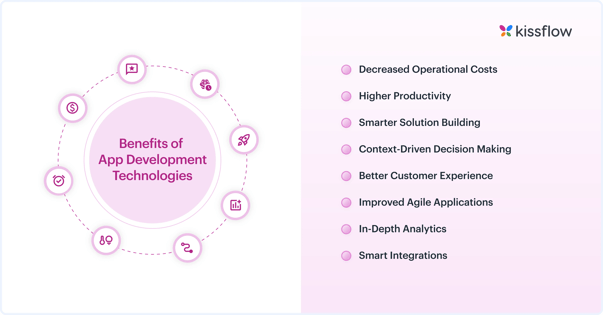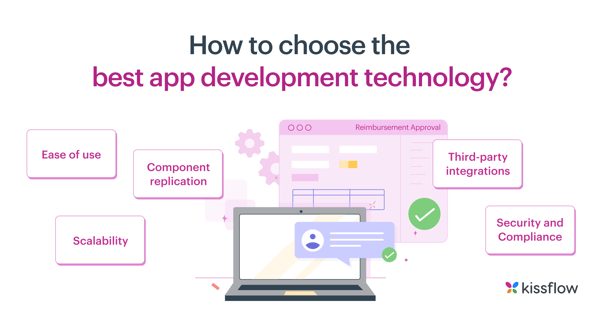
- >
- Application Development >
- Top App Development Technologies to Watch Out for in 2025
Top App Development Technologies to Watch Out for in 2025
Team Kissflow
Updated on 28 Apr 2025 • 5 min read
Building applications is often perceived to be a lengthy process. Traditionally, app development may take months to create effective business solutions from the ground up. The planning, design, development, testing, and deployment stages are delicate and there’s little room for error. This is because app development methodologies are based on pre-established phases and the flow of development is unidirectional.
Needless to say, traditional app development is not only ineffective but presents a lot of aspects that further delay the process. And this is why companies need to think carefully about the technologies and frameworks they choose to strengthen their app-building process.
What are app development technologies?
App development technologies are tools and platforms that allow developers to create applications. Today's application development technologies are far more advanced such as cloud computing, artificial intelligence (AI), the Internet of Things (IoT), and low-code/no-code. These technologies allow developers to create powerful, innovative applications.
New technologies make it easier for developers to build applications that meet the demands of modern businesses. One prominent technology is low-code/no-code (LCNC). LCNC is now the preferred app development method among businesses. Organizations that use LCNC produce apps quickly and outperform the competition.
Benefits of application development technologies

App development technologies and frameworks come with a host of advantages. Here are a few of them:
- Decreased operational costs
- Higher productivity
- Smarter solution building
- Context-driven decision making
- Better customer experience
- Improved agile applications
- In-depth analytics
- Smart integrations
Importance of staying up-to-date with the latest technologies
Increased Efficiency
Businesses that keep up with the latest technologies reduce manual labor, save time, and increase productivity. Technology can help businesses automate certain processes, saving time and making operations more efficient.
Stay Competitive
Technology has become an integral part of business. Competition in the marketplace is fierce, and companies that stay abreast of the latest trends take advantage of new opportunities and gain an edge over their competitors.
Enhanced Security
As cyber threats increase, businesses must ensure their systems and data are secure by using technology. They must protect themselves from potential threats and safeguard their systems from attacks.
Types of app development technologies
Native app development
Native apps are usually designed for a specific platform, such as iOS or Android. The app is tailored to the platform’s look and feel to provide a better user experience. Native apps tend to be faster because they are optimized to run on a particular platform. But they can be more expensive to develop.
Hybrid app development
Hybrid app development combines native app development with web development. The app is written in programming language and then wrapped in a native application container. This allows it to run on different platforms as well as web browsers. Hybrid apps offer the best of both worlds as they utilize new web development techniques and also provide a native look and feel.
Web app development
Web apps run in a web browser and are typically faster to develop than native apps as they don’t need additional coding. However, they are limited by the capabilities of the browser and don’t have access to mobile device features such as the camera or GPS.
Cross-platform app development
Cross-platform app development allows an app to be built once and then deployed on multiple platforms. Using cross-platform development tools such as React Native or Flutter, developers can create apps that run on different platforms without having to rewrite the code. This saves them time and money. But because cross-platform apps use a single codebase, the end-user experience can be poorer.
Learn more about best application development software
Low-code/no-code app development
Low-code/no-code app development technologies allow pro developers and subject matter experts to quickly build apps without writing complex code. Platforms such as Kissflow provide drag-and-drop tools and templates that simplify app-building. They are ideal for businesses that don’t have the money to hire pro developers and those that need to develop apps quickly.
How to choose the best app development technology?

Choosing an application development technology and framework isn't hard. Following are some of the points to choosing it.
1. Ease of use
A good app development platform should have an easy-to-use interface that allows even novice users the ability to build their apps. An app development platform is ideal for users looking to build apps without having to rely heavily on coding expertise.
Learn more: How to develop an application in 2025
2. Third-party integrations
Traditionally, data is left isolated in silos. An effective app development system should be able to help you connect the apps and business processes with ease. This ensures greater cohesion and data efficiency across business processes.
3. Security and Compliance
In today’s complex business environment, it’s vital to have processes modeled in accordance with industry compliance. When choosing a technology for your business, it’s important to ensure a high standard of security, policy, and compliance.
Learn more: Everything about application development security
4. Component replication
It’s not enough to enable better results, it’s also necessary for businesses to be able to replicate processes. A great app development platform enables processes to be replicated with ease to ensure time is saved in scenarios that call for it.
5. Scalability
Every organization grows at different rates. While it’s important to deliver great functionality, it’s equally important to choose a solution that grows with the organization—whether that means accommodating needs or adding new users.
Learn more: Digital application development
Top app development technologies to look out for in 2025
While the traditional app development method works, projects are often complex, expensive, and get delayed due to factors such as coding errors, testing challenges, and infrastructure delays. Furthermore, apps built with the traditional approach require a continuous maintenance cycle by developers to keep them secure and up-to-date. That’s where new technology in application development comes in.
The top app development technologies in 2025 are
- Low-Code
- No-Code
Low Code
Low-code allows pro developers and non-developers to quickly build applications by doing away with the need to write code line by line. Small-business owners, business analysts, office administrators, and other non-IT professionals can build and test applications.
No Code
No-code application development allows non-programmers to build apps through graphical user interfaces and configuration without writing code. No-code significantly reduces the need to write code and increases the speed at which applications are built and deployed.
Both app development technologies enable rapid application development and help businesses achieve their goals with the resources they have, however, limited. They bridge the gap between IT and business units. Non-IT professionals can quickly solve the issues that impact their departments and boost productivity. They don’t have to wait for developers.
Learn more: App development for startups
Which app development technology is right for you?
Low-code app development platforms are designed to simplify the process of creating applications by minimizing the need for manual coding. They can be very helpful for IT managers who should swiftly address the growing demand for digital solutions across all sectors. LCAP platforms enable rapid application development through visual programming environments and pre-built templates, significantly reducing the need for traditional hand-coded programming.
Low-code and no-code are shaping the future of app development
Organizations are increasingly recognizing the value of low-code and no-code platforms in accelerating application development and driving business agility. These platforms empower businesses to create robust applications while maintaining IT governance over data, systems, and functionality. By fostering collaboration between IT and business teams, they enable faster development cycles and quicker realization of goals.
With their shorter learning curve, cost-effectiveness, and ability to streamline complex development processes, low-code, and no-code tools are redefining how applications are built, making them indispensable for modern enterprises.
Learn more about how AI is shaping a future of software development.
Discover how our customers drive impact—read their success stories.
Frequently asked questions
Which technology is best to create an app?
The best app development technology is low-code/no-code, especially if you want to create your app quickly and cost-effectively. Low-code apps require minimal code, while no-code apps require none at all. Non-technical users can quickly develop apps to enhance business functions.
How to select the right app development technology
- Analyze your app-development needs
- Research your options and factor in your budget
- Consider integrations, system compatibility, and return on investment
- Choose a platform that meets your needs
How does an LCNC platform compare with other technologies?
LCNC platforms are more cost-effective than traditional development technologies. Apps can be deployed in a fraction of the time and delivered to end-users faster. These platforms are also scalable and flexible. Users can easily add new components, functions, and features to apps to meet changing business needs and demands. Businesses can quickly adapt to marketplace changes and build new solutions that allow them to stay ahead of the competition.
Empower your business with a custom app.
-3.webp)
How much could your organization save with low-code?
Get the impact of a low-code/no-code platform on your application development costs
Related Articles











